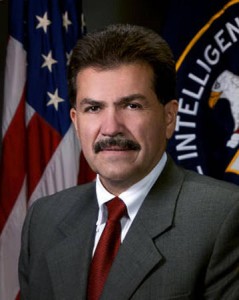This piece was reprinted by OpEd News with permission or license. It may not be reproduced in any form without permission or license from the source.
Cross-posted from Consortium News
Jose Rodriguez, former director of operations for the Central Intelligence Agency.
Would-be tough guys like former CIA torturer-in-chief Jose A. Rodriguez Jr. brag that "enhanced interrogation" of terrorists -- or doing what the rest of us would call "torturing" -- has made Americans safer by eliciting tidbits of information that advanced the search for al-Qaeda leader Osama bin Laden.
Rodriguez makes this case again in the Sunday's Washington Post Outlook section in the context of the new "hunt-for-bin-Laden" movie, "Zero Dark Thirty," though Rodriguez still disdains the word "torture." He's back playing the George W. Bush-era word game that waterboarding, stress positions, sleep deprivation and other calculated pain inflicted on detainees in the CIA's custody weren't really "torture."
Yet, while quibbling with some details of the movie and its gory depiction of "enhanced interrogation techniques," Rodriguez largely agrees with the film's suggestion that the harsh tactics played a key role in getting the CIA on the trail of bin Laden's courier who eventually led Seal Team 6 to bin Laden's hideout in Abbottabad, Pakistan.
Rodriguez writes, "I was intimately involved in setting up and administering the CIA's 'enhanced interrogation' program ... our program worked -- but it was not torture ... and enhanced interrogation techniques played a role in getting bin Laden."
But others familiar with the chronology of events dispute that the "enhanced interrogation techniques" were responsible for any significant breaks in the case. Sens. Dianne Feinstein and Carl Levin, chairs of the Senate Intelligence Committee and the Armed Service Committee respectively, have asserted that "The original lead information had no connection to CIA detainees" and a detainee in CIA custody who did provide information on bin Laden's courier "did so the day before he was interrogated by the CIA using their coercive interrogation techniques."
Beyond those comments by the committee chairs, the Senate Intelligence Committee on Dec. 13 approved a long-awaited report concluding that harsh interrogation measures used by the CIA did not produce significant intelligence breakthroughs, officials have said.
The report is said to make a detailed case that subjecting detainees to "enhanced interrogation" did not help find bin Laden and often was counter-productive in the broader campaign against al-Qaeda. Feinstein called the CIA's decisions to build a network of secret prisons and employ these harsh interrogation measures "terrible mistakes."
The Downside of Torture
Besides the moral opprobrium that the practices brought upon the United States, the CIA's use of torture alienated many Muslims who otherwise would have felt no sympathy for Islamic extremists. For example, U.S. military interrogators report that the vast majority of jihadists who came to fight against U.S. forces in Iraq were motivated by the disclosures about torture at Abu Ghraib and Guantanamo.
FBI interrogators also have said their rapport-building techniques with an early detainee, logistics specialist Abu Zubaydah, were succeeding in eliciting important information from him before the CIA interrogators arrived and insisted on applying their brutal methods.
Author Jane Mayer in her book The Dark Side writes that the two FBI agents, Ali Soufan and Steve Gaudin, "sent back early cables describing Zubaydah as revealing inside details of the [9/11] attacks on New York and Washington, including the nickname of its central planner, 'Mukhtar,' who was identified as Khalid Sheikh Mohammad [KSM]. ...
"During this period, Zubayda also described an Al Qaeda associate whose physical description matched that of Jose Padilla. The information led to the arrest of the slow-witted American gang member in May 2002, at O'Hare International Airport in Chicago. ..."Abu Zubayda disclosed Padilla's role accidentally, apparently. While making small talk, he described an Al Qaeda associate he said had just visited the U.S. embassy in Pakistan. That scrap was enough for authorities to find and arrest Padilla... who was suspected of plotting a 'dirty bomb' attack inside the United States (although he was never charged with that offense).
"In 2009, Soufan broke his personal silence on the topic in an op-ed in the New York Times, citing Zubaydah's cooperation in providing information about Padilla and KSM before the CIA began the harsh tactics. 'It is inaccurate ... to say that Abu Zubaydah had been uncooperative,' Soufan wrote. 'Under traditional interrogation methods, he provided us with important actionable intelligence.' [NYT, April 23, 2009]"
Nevertheless, Bush administration defenders have cited the information wrested from Zubaydah -- who was waterboarded at least 83 times in August 2002 -- as justification for the interrogation tactics that have been widely denounced as torture.
The problem of eliciting false intelligence was demonstrated by the handling of another al-Qaeda captive, Ibn al-Shaykh al-Libi, who responded to threats of torture by fabricating an operational link between Saddam Hussein's government and al-Qaeda. It was exactly the kind of information that the Bush administration had been seeking to justify its desired invasion of Iraq.
By Feb. 11, 2003, as the countdown to the U.S. invasion progressed, CIA Director George Tenet began treating al-Libi's assertions as fact. At a Senate Intelligence Committee hearing, Tenet said Iraq "has also provided training in poisons and gases to two al-Qa'ida associates. One of these associates characterized the relationship he forged with Iraqi officials as successful."
(Note: You can view every article as one long page if you sign up as an Advocate Member, or higher).





